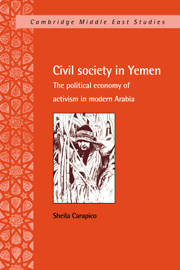Book contents
- Frontmatter
- Contents
- List of tables
- Preface and acknowledgments
- Note on transliteration and terminology
- List of abbreviations
- Map
- 1 Civil society in comparative perspective
- 2 Twentieth-century states and economies
- 3 Islam, tribes, and social services
- 4 Colonialism, activism, and resistance
- 5 Self-help, social capital, and state power
- 6 Unity, pluralism, and political participation
- 7 Civic responses to political crisis
- 8 Political movements, cultural trends, and civic potential
- Endnotes
- Glossary
- Bibliography
- Index
8 - Political movements, cultural trends, and civic potential
Published online by Cambridge University Press: 02 December 2009
- Frontmatter
- Contents
- List of tables
- Preface and acknowledgments
- Note on transliteration and terminology
- List of abbreviations
- Map
- 1 Civil society in comparative perspective
- 2 Twentieth-century states and economies
- 3 Islam, tribes, and social services
- 4 Colonialism, activism, and resistance
- 5 Self-help, social capital, and state power
- 6 Unity, pluralism, and political participation
- 7 Civic responses to political crisis
- 8 Political movements, cultural trends, and civic potential
- Endnotes
- Glossary
- Bibliography
- Index
Summary
The two-part hypothesis with which this study began was that civic spaces are defined by political, economic, and cultural factors, and in turn civic activism has discernible (though certainly not determinant) effects on states, material conditions, and popular culture. A particular effort has been made to demonstrate the dynamic, contested, even contradictory elements of this process. The task of this conclusion is to summarize the generalizations that can and cannot be drawn from this study of Yemen about Arab culture, political economy, and civic potential.
Yemen is so far off the beaten path that even Arab or Western Middle East specialists often neglect to visit. To the extent that a conventional wisdom exists about Yemen, however, it is that a combination of Islam and tribalism explains everything. Journalists infer from outward appearances (men wearing skirts and daggers, women in all-encompassing black, aesthetic preferences for indigenous architecture, and the folksy exoticism of the scenery) that something along the lines of the “Islamic conservatism of the traditional tribes of the north” accounts for political outcomes. Conveniently unencumbered by facts about recent history, this shallow cultural determinism does not hold up to close scrutiny. Islamic and tribal law have been used as the antonym for ideal-typical Western modernism by writers from Weber to Huntington, but in an era of post-modern scholarship no serious analysis can result from laying a traditional–modern/primordial–civic heuristic foil sidewise across geography, as though some places are frozen in time while others have history.
Culture is certainly important to understanding the civic life of any polity. In Yemen culture plays a salient role in the sorts of social, intellectual, political, and voluntary activities covered in this study.
- Type
- Chapter
- Information
- Civil Society in YemenThe Political Economy of Activism in Modern Arabia, pp. 201 - 211Publisher: Cambridge University PressPrint publication year: 1998



